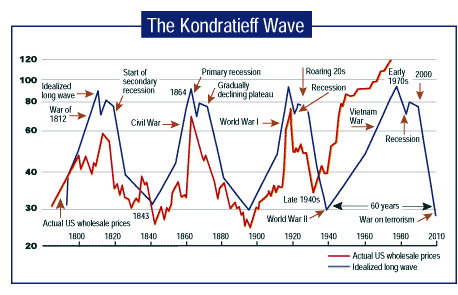Now Is the Winter of our Discontent: Our Era of Rising Discord
November 16, 2016
It becomes increasingly difficult to believe central planning policy tweaks can ensure a permanent extension of cooperation and prosperity.
Mao Zedong supposedly said, "There is great disorder under the Heavens and the situation is excellent." For those seeking to replace the existing social and economic order, chaos is a good first step.
Those with a stake in the system decaying into disorder feel differently: for them, disorder is threatening and frightening.
Do we control the slide into disorder and the emergence of a new order? The short answer is no: the forces at work are systemic and structural, and not controllable with the usual political/economic tools.
Historian Peter Turchin explores historical cycles of social disintegration and integration in his new book Ages of Discord.
Turchin proposes a model of rising discord that eventually leads to a new cycle of cooperation and compares the expected result with historical data. He finds 25-year cycles that combine into roughly 50-year cycles, comparable (though not identical with) Kondratieff's proposed economic cycles (see chart below).
These 50-year cycles are part of longer 150 to 200-year cycles that move from cooperation through an age of discord and disintegration to a new era of cooperation.
This work draws upon his previous books, including War and Peace and War: The Rise and Fall of Empires, which I referenced in Following in Ancient Rome's Footsteps: Moral Decay, Rising Wealth Inequality (September 30, 2015) and The Lesson of Empires: Once Privilege Limits Social Mobility, Collapse Is Inevitable (April 18, 2016).
These long cycles parallel the cyclical analysis of David Hackett Fischer, whose masterwork The Great Wave: Price Revolutions and the Rhythm of History I've referenced many times over the years, most recently in We've Entered an Era of Rising Instability and Uncertainty (July 18, 2016).
Turchin's model identifies three primary forces in these cycles:
1. An over-supply of labor that suppresses real (inflation-adjusted) wages
2. An overproduction of essentially parasitic Elites
3. A deterioration in central state finances (over-indebtedness, decline in tax revenues, increase in state dependents, fiscal burdens of war, etc.)
These combine to influence the broader social mood, which is characterized in eras of discord by fragmented loyalty to self-serving special interests (disintegration) and in eras of cooperation by a desire and willingness to cooperate and compromise for the good of the entire society (integration).
Rising discord can be quantified in a Political Stress Index. Do we find evidence of Turchin's disintegrative forces in the present era?
1. Stagnating real wages due to oversupply of labor: check.
2. Overproduction of parasitic Elites: check.
3. Deterioration in central state finances: check.
Is it any wonder that political stress, however you want to measure it, is rising?
Cycles are the result of the interaction of complex, non-linear dynamics, and so they are not entirely predictable in terms of pinpointing the exact moment of crisis or the outcome of a systemic crisis.
If we study Turchin's model and Fischer's work on Price Revolutions and the Rhythm of History, it becomes increasingly difficult to believe central planning policy tweaks can ensure a permanent extension of cooperation and prosperity.

Join me in seeking solutions by
becoming
a $1/month patron of my work via patreon.com.
My new book is #8 on Kindle short reads -> politics and social science: Why Our Status Quo Failed and Is Beyond Reform ($3.95 Kindle ebook, $8.95 print edition) For more, please visit the book's website.
NOTE: Contributions/subscriptions are acknowledged in the order received. Your name and email remain confidential and will not be given to any other individual, company or agency.
|
Thank you, Keith T. M. ($5/month), for your superbly generous subscription to this site-- I am greatly honored by your support and readership. |

Discover why Iím looking to retire in a SE Asia luxury resort for $1,200/month. |